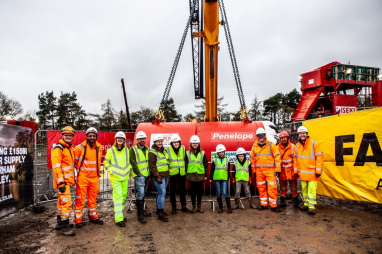- Кросівки nike air max correlate (оригінал, 39 р). — цена 750 грн в каталоге Кроссовки ✓ Купить женские вещи по доступной цене на Шафе, Украина #109005122 , nike kyrie 1 easter on feet images and names free
- air jordan 5 island green releasing in november (2023) , SBD , air jordan 5 island green releasing in november
- air jordan 1 mid outlet
- nike air force with skinny jeans girls , Manor PHX – Cheap Ietp Jordan Outlet , Premium Footwear & Streetwear Boutique
- Sneakers Draked Viola
- Travis Scott Air Jordan 1 High OG CD4487 100 Release Date Price
- kids air jordan
- eastbay restock large amount air jordans
- Air Jordan 1 Mid Bred 554724 074 2020 Release Date 4
- nike air force 1 low white gold dc2181 100 release date info
- Home
- News and analysis
- Info hubs
- Events
- Video
- Case Studies
- About us
- Magazine
- Advertising
Produced for the industry by the Association for Consultancy and Engineering
News
Andy Mitchell interview:Rejoining London to the Thames
The £4.2bn Thames Tideway Tunnel is the largest infrastructure project ever undertaken by the UK water industry and will tackle sewage pollution in the tidal River Thames. Infrastructure Intelligence caught up with chief executive Andy Mitchell to take stock of its progress, and get his take on the industry – including why engineers need to be more imaginative in naming projects
Are you on track to deliver?
Yes. I keep on having to pinch myself that as a company and a project we’re only a few months old. Coming out of Thames Water, there was a huge amount to do just to set the company up, and that happened on 24 August. It was the same day we awarded the £2bn-worth of construction contracts. The challenge for us is that we’re both a business and a regulated water company, and we’ve got investors who together have invested over £3bn.
We’re building a big tunnel, but we see this as an opportunity to transform the Thames and London’s relationship with it. Additionally, we are a going concern, so it would be a mistake to think we’re just here to dig holes and then go away.
Community relations: talk us through your approach?
We’re trying to be friends with everyone and setting up community working groups. We’ve got to make it clear we’re in listening mode. The legislative process can be very bruising. It’s argued in legalistic terms, engineering terms; it has to be. But that’s not the same as bringing people with you. We now have a job to do to establish a new, more productive relationship.
Do civil engineering projects have trouble communicating their worth?
Civil engineering and infrastructure have to explain about more than just the product, i.e. the tunnel. We need to do a much better job helping our neighbours – and society – understand the broader benefits of what we’re doing. But, of course, your immediate neighbours have their own concerns, and telling them how wonderful the world’s going to be doesn’t address that.
So you’ve got to do both. And we’ve got to say to our neighbours: what can we do to be the least nuisance, the least blight possible? It’s important to admit we are a worry for them, and that we are going to affect their lives.
How do you describe the project?
We did a lot of work on this, and we summarised it by saying we’re reconnecting London with the Thames. We’re doing something quite special – it’s a once-in-a-generation opportunity to fix things, for us and the people that follow: providing a river that can and should do an awful lot more for London, and the economy more broadly. Our success, and how we’re viewed, will be on that outcome. Calling it “the tunnel” was probably giving it the wrong name.
Engineers are very good at naming/ describing what we’re building (HS2, Terminal 5), but that’s not good when trying to describe an outcome, and why society should feel good about it. It’s something we need to get better at.
You’ve been chairing the Infrastructure Client Group for a year – how’s it going?
What is clear, after five years of the ICG, is that we keep turning up, and we do that because we’re getting a lot out of it, talking to each other. As time goes by, people are much more candid, and we can talk about the cock-ups.
What’s exciting about the environment we’re in now is that there’s a government/pan-party appreciation of the value of investing in infrastructure – for the short-term economic stimulus and also for its part in creating a better future. That’s been growing over recent years, thanks to infrastructure projects being successfully delivered. And we find ourselves now with a National Infrastructure Commission, which isn’t something we had a while back. So we’ve got a really good opportunity to have a look as an industry at what we’ve been doing – but there’s no doubt in my mind there are far too many groups in this industry all chasing the same list of projects.
Which one should go, then?
All except mine! Seriously, what I hope will come out of this is a greater focus in parts of the industry on issues they’re best placed to deal with, a recognition by the groups that their role is to support and complement rather than replicate. And if that’s all we achieve this year, as we see the National Infrastructure Commission being defined and developed and the new Infrastructure & Projects Authority getting greater clarity on its role, there’s a real opportunity for industry to step up to that and try to speak with fewer voices.
A whole-life agenda: how do we get the industry to accept that?
The encouraging thing is that this is now a more common question and when we talk about outcomes versus outputs, you don’t get the glazed look you might have done five years ago. So it’s positive that we should be talking about outcomes, for two reasons – one is we need to do a better job of explaining to society what the outcome and what the benefit is. I am convinced that if we did that better, we’d spend less money getting the job to planning permission acceptance. Secondly, if we were clearer on what the outcome was, we’d stand a better chance of enlisting the huge capabilities of the industry to deliver a solution that works, and one that could be radically different.
Take highways: the answer to more road capacity used to be more tarmac; now it’s technical solutions. And the roadbuilder’s biggest rival is now Google. So the more we understand outcomes, the more we’re going to see technology deliver answers that five years ago we might not even have thought of.
The answer to more road capacity used to be more tarmac; now it’s technical solutions. So the more we understand outcomes, the more we’re going to see technology deliver answers that five years ago we might not even have thought of.
Andy Mitchell
But no one’s making enough money to invest in this kind of technology. No, they’re not. There’s got to be a model that allows contractors and consultants in this space to invest in the things we all want them to – training and development, research. It’s extraordinarily hard to do that when you’re billing at two or three per cent.
Look at the automobile and aerospace industries: they wouldn’t get out of bed for that. Their 30 per cent markup allows them to invest in all these things that make them better.
While we are in single-digit territory, I don’t think we’re going to have an industry that’s fit and capable of taking us anywhere. And it’s only the clients who can get us there. As long as we preside over a situation where it’s the lowest price that wins the job, we can’t be surprised when we don’t get the kind of capabilities we’re after.
Wherever the money is coming from, we’ve got to have a way more grown-up conversation about where this industry is going. The horse we’ve been flogging is not getting any faster.
Andy Mitchell was interviewed by Infrastructure Intelligence’s former editor, Antony Oliver, in the Straight Talk series, filmed by ACOonAir. The video is available at www.infrastructure-intelligence.co.uk.





